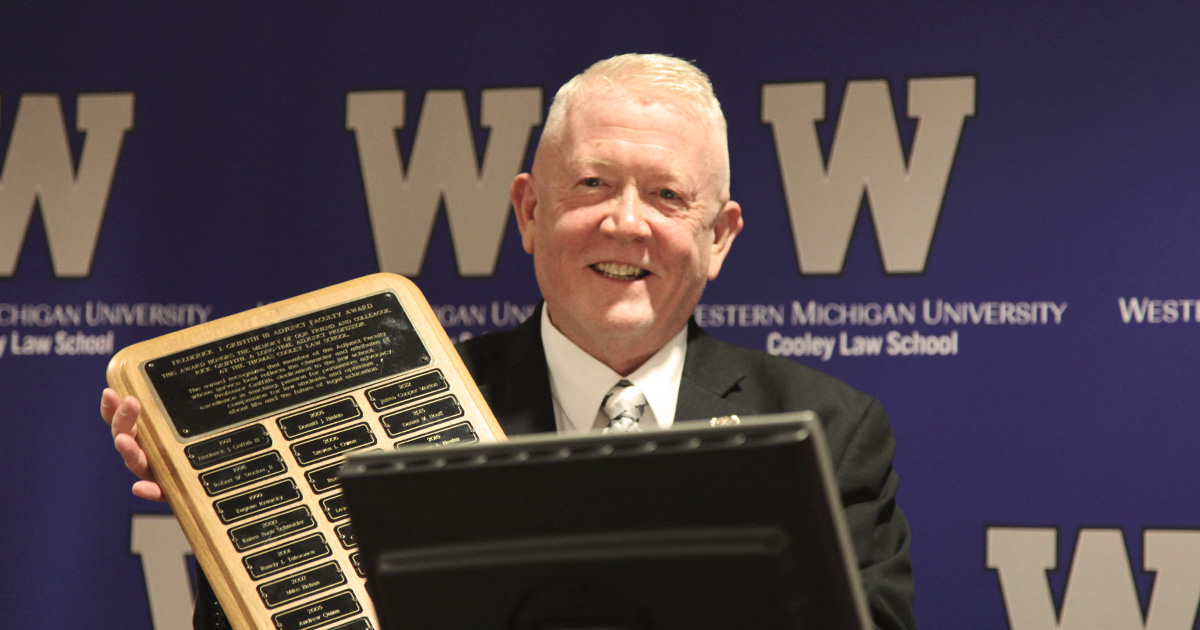Adjunct Law Professors: Blessing or Curse?

From its earliest days, Cooley Law School has employed the services of adjunct (part-time) professors. The faculty members hired to teach the very first entering class in 1973 were all part-timers. They consisted of two lawyers, an appellate judge, and a former prosecuting attorney.
To satisfy American Bar Association requirements, ultimately the law school switched to the full-time faculty model for required courses. But adjunct professors have continued playing an important role in fulfilling the school’s mission of practical legal education by teaching upper-level elective courses. Today Cooley’s faculty roster consists of 59 full-time professors and 150 adjuncts.
SPECIALIZED PRACTICES AND EXPERTISE
The dedicated, experienced, and talented members of the adjunct faculty blend teaching with active careers. Over the years, Cooley’s adjuncts have included trial and appellate judges, Assistant Attorneys General, county prosecutors and defense attorneys, solo practitioners and big-firm partners, corporate officers and house counsel, and even a Canadian barrister.
One dedicated adjunct, attorney William Burt Burleson, retired recently after teaching an unbroken string of three terms each year for 30 years straight. It has to be some kind of record.
In addition to providing doctrinal instruction and helping develop practical skills, adjuncts provide students with valuable insights into the demands and rewards of their specialized practices.
Today the ABA Section of Legal Education and Admission to the Bar requires only that the first-year curriculum and more than half of total credit hours be taught by full-time faculty members (Standard 403(a)). The requirement liberalizes an earlier mandate that full-timers must teach “the major portion” of the law school curriculum.
The ABA’s Manual for Law Schools on Adjunct Faculty recognizes the “significant and valuable role” adjunct faculty members play in most law schools in this country. The mission of the ABA’s Adjunct Faculty Committee is to provide a forum for law schools to discuss ways to recruit, train, mentor, and supervise adjuncts. The committee has issued two helpful publications: a Best Practices Report on the Use of Adjunct Faculty, and an Adjunct Faculty Handbook.
NOT ALL ADJUNCTS EQUAL
Regrettably, in recent times a handful of adjunct professors have embarrassed their law schools. At the University of Pittsburg School of Law an adjunct was condemned for using the n-word in class. He apologized and resigned. Georgetown Law Center fired an adjunct who made “abhorrent” remarks about Black students on a video call. An adjunct at New York University School of Law who taught a course on government ethics helped ex-Gov Andrew Cuomo attempt to discredit a sexual-harassment complainant.
Cooley has not experienced the curse of adjunct malfeasance. The law school is proud that the ABA recognizes the value of what Cooley has demonstrated for nearly 50 years: that drawing adjunct teachers from the bench and bar can strengthen the important mission of imparting a practical legal education. Our adjuncts have been an unmitigated blessing.
The author, Distinguished Professor Emeritus Otto Stockmeyer, began his teaching career at Cooley Law School in 1976 as an adjunct professor, teaching a legal writing course. He was soon invited to join the full-time faculty and over the years taught Contracts and Equity and Remedies. Now retired from classroom teaching, he continues to maintain an interest in helping students achieve success. This blog post is adapted from an earlier 2017 one.

